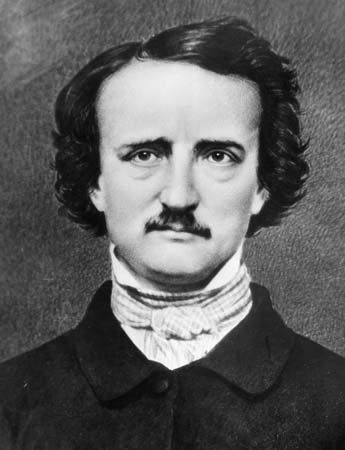On this date in 1809, writer Edgar Allan Poe was born in Boston. When his parents, both actors, died before he was 3, he was adopted by John Allan, who educated him in London and Virginia. Poe attended the University of Virginia for one year before dropping out. He began writing poetry, served in the U.S. Army for two years and was awarded a prize for a short story in 1833. He moved to Baltimore and lived with his widowed aunt and her daughter, Virginia, and began editing the Southern Literary Messenger.
He married his 13-year-old cousin, Virginia Clemm, in 1836 and moved with her to New York City and Philadelphia, living in poverty while in search of better writing positions. His only complete novel, The Narrative of Arthur Gordon Pym of Nantucket (1838), was followed by Tales of the Grotesque and Arabesque (1839), The Pit and the Pendulum (1842), The Tell-Tale Heart (1843) and other works classified as tales. Poe is considered a pioneer of thrillers and detective fiction, writing The Murders in the Rue Morgue (1841), The Mystery of Marie Roget (1842), The Gold Bug (1843), and The Purloined Letter (1844).
The Raven, and Other Poems, was published to great acclaim in 1845. Virginia died of tuberculosis in 1847, inspiring Poe’s famous poem “Annabel Lee.” His “prose poem” Eureka, according to freethought historian Joseph McCabe, “embodies a Pantheism which is not far removed from Agnosticism.” (A Biographical Dictionary of Modern Rationalists, 1920.) In it, Poe wrote that we know nothing about the nature of God, that nature and God are the same, and there is no personal immortality.
He died unexpectedly at age 40 in 1849 in Baltimore. The cause of his death was never resolved and was attributed at the time by newspapers to “congestion of the brain” or “cerebral inflammation,” common euphemisms for alcoholism.


